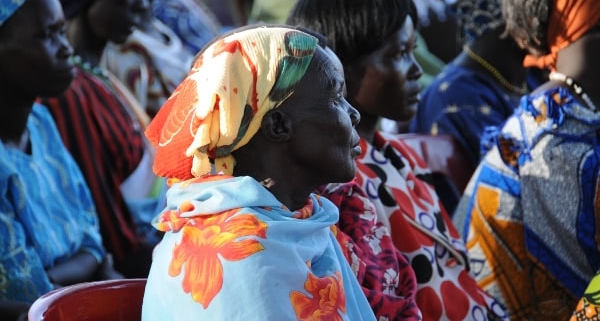Women in South Sudan are subject to limited access to political, economic, social resources due to the country’s rigid patriarchal structure. Nevertheless, women have been negotiating their agency and influence for decades, playing a crucial role in state-building, peacebuilding, and development processes. Beyond their formal role as agents of peace, considering the informal dimensions through which South Sudanese women influence peace and conflict are vastly significant for aid actors to grasp conflict dynamics and the…
repository
CSRF Research Repository
The CSRF Research Repository aims to support greater contextual knowledge for policy makers, programme managers, and implementers by providing a searchable repository of research, analysis, and resources, and providing periodic updates on new research and analysis.
This report explores the practice of bride prices in South Sudan and its related social, economic, and political implications on gender relations and violent conflict. The report suggests that the bride price appears to contribute to gender-based violence and violent conflict in the country. The report also provides insights on how stakeholders can tackle these challenges linked to the practice of bridge price. Read more here
This report examines the extent to which sexual and gender-based violence (SGBV) intersects with the ongoing cycles of violence in South Sudan and cultural norms. Using the case study of Wau town, the report finds a high prevalence of SGBV and identifies challenges that hamper efforts to address it, as well as provides recommendations on how to address the SGBV, including rape, through the legal, social and cultural measures. Read here
In this blog, Lona Elia Morgan and Livia Oliver discuss the concept of gender and conflicting perceptions of the concept among South Sudanese communities. Based on their extensive gender work, they explore different perceptions around gender and the related impact on conflict dynamics, as well as on aid programming, providing insights on how aid actors can change these perceptions and mitigate risks on aid interventions. In South Sudan, gender sensitivity is increasingly being integrated…
Focusing on the governor of Western Bar El Ghazel state, Sarah Cleto, this Situation Update discusses successes and challenges of her administration. Despite her grassroots popularity, members of the opposition are calling for her removal. Attempts to replace Cleto, however, have been stalled by internal power struggles—highlighting the complexities of Western Bahr el Ghazal’s ethnic politics. Read here
Focusing on gender in South Sudan, this meta-analysis provides an overview of the literature available on gender dynamics with a special attention on women. It looks at their role in politics and peacebuilding, conflict related sexual violence (CRSV) and sexual and gender-based violence (SGBV), and explores the changing roles of women in times of conflict. The analysis concludes with a brief assessment of gendered access to education and its evolution over time.
With governance increasingly regarded as co-governance, states’ capacity to steer, correct, and discipline a wide range of self-governing actors becomes crucial for states’ effectiveness, efficiency, and democracy. This article investigates that capacity and the relationship between formal institutions and customary self-governance in areas of limited statehood. In South Sudan, the field of land governance can be regarded as an area of limited statehood. As land relations are closely connected to clan structures and intra-familial relationships,…
This paper examines the current state of women’s participation in organized politics through the lens of young women’s political experiences. It contextualizes women’s participation in party politics in its history and shares findings from conversations with young women about their experiences and challenges in their political work. It finds that young women in politics are doubly marginalized by gender and age. Key recommendations: Collect and publicly avail data on the participation of female youth in…
The world is in the midst of a devastating, and escalating, hunger crisis. At least 345 million people across 82 countries are currently facing or are at risk of acute food insecurity, with 50 million people on the brink of starvation, teetering on the edge of famine (Source: World Food Programme). This report presents new evidence on the gendered impacts of the current global hunger crisis from eight of the countries most affected: Ethiopia, Kenya,…
With increasing numbers of drought-affected people in the region coupled with inflation and the impacts of the Ukraine war, there is a need to have a structured approach on how to respond to drought-related humanitarian concerns. The impact of the drought in the Horn of Africa has led to loss of livelihoods, food insecurity, malnutrition, water scarcity, epidemics, conflicts, children dropping out of school and protection risks such as child marriage and sexual and gender-based…

Some Infos
Lorem ipsum dolor sit amet, consectetuer adipiscing elit. Aenean commodo ligula eget dolor.
Pages
- About Our County Profiles
- Blog
- Case Studies Grid
- Central Equatoria
- Conflict Sensitivity Resource Facility South Sudan
- Contact Us
- Contribute a Repository Article
- County Profile HTML links
- County Profiles
- COVID-19 HUB
- Covid-19 information page
- CSRF About Us
- CSRF Helpdesk
- CSRF Helpdesk Form
- CSRF Login
- Dashboard
- Deliverables
- Demo
- Events
- Forgot password
- Guides, Tools and Checklists
- Helpdesk
- Home
- Latest
- Looker Studio
- Subscribe

